The Comp Alliance will provide program members with more than 50 LIVE Video-Conference Trainings via ZOOM in November and December 2020. These trainings will be conducted on the PESH-required topics of:
- Workplace Violence
- Right-To-Know – Chemical Safety
- Blood-Borne Pathogens
We are offering these on a first-come, first-serve basis as ATTENDANCE IS LIMITED.
Please contact This email address is being protected from spambots. You need JavaScript enabled to view it. to register for one of the applicable programs – the session schedule is as follows:
DATES and TIMES
A seminar including the NY State Mandated Safety Training topics that are required for ALL municipal employees, administrators, board members, volunteers, and seasonal hires on an annual basis. Please note we are offering evening trainings on 11/5, 11/12, 11/18, 12/2, 12/10, 12/14, 12/22 and 12/28.
Several of the dates and we are also offering Hazardous Waste Operations Emergency Response (HAZWOPER) seminars including 11/2, 11/10, 11/13, 11/16, 11/17, 11/18m 11/19, 11/24, 12/3, 12/8, 12/10, 12/15, 12/16, 12/17, 12/18, 12/28. Please visit our events calendar for the full listing of dates and times. https://www.compalliance.org/events.html
November
Monday, 11/2 - 10:00 - Noon
Wednesday, 11/4 - 1:00 - 3:00 p.m.
Thursday, 11/5 - 10:00 - Noon
Thursday 11/5 - 6:00 - 8:00 p.m.
Friday 11/6 - 10:00 - Noon
Monday 11/9 - 10:00 - Noon
Tuesday 11/10 - 10:00 - Noon
Thursday 11/12 - 10:00 - Noon
Thursday 11/12 - 6:00 - 8:00 p.m.
Monday 11/16 - 10:00 - Noon
Tuesday 11/17 - 10:00 - Noon
Wednesday 11/18 - 1:00 - 3:00 p.m.
Wednesday 11/18 - 6:00 - 8:00 p.m.
Thursday 11/19 - 1:00 - 3:00 p.m.
Monday 11/23 - 10:00 - Noon
Monday 11/30 - 10:00 - Noon
December
Tuesday 12/1 – 10:00 – Noon
Wednesday 12/2 – 10:00 – Noon
Wednesday 12/2 – 5:00 – 7:00 p.m.
Thursday 12/3 – 1:00 – 3:00 p.m.
Monday, 12/7 – 10:00 - Noon
Tuesday, 12/8 – 1:00 – 3:00 p.m.
Wednesday, 12/9 – 10:00 – Noon
Thursday, 12/10 – 10:00 – Noon
Thursday, 12/10 – 6:00 – 8:00 p.m.
Monday, 12/14 – 10:00 – Noon
Monday, 12/14 – 5:00 – 7:00 p.m.
Tuesday, 12/15 - 10:00 - Noon
Wednesday, 12/16 – 10:00 – Noon
Thursday, 12/17 – 1:00 – 3:00 p.m.
Monday, 12/21 – 10:00 - Noon
Tuesday, 12/22 – 10:00 – Noon
Tuesday, 12/22 – 5:00 – 7:00 p.m.
Monday, 12/28 – 10:00 – Noon
Monday, 12/28 – 6:00 – 8:00 p.m.
Tuesday, 12/29 – 10:00 – Noon
Wednesday, 12/30 – 10:00 - Noon
Contact Robert Blaisdell by email This email address is being protected from spambots. You need JavaScript enabled to view it. to register for any of these seminars.
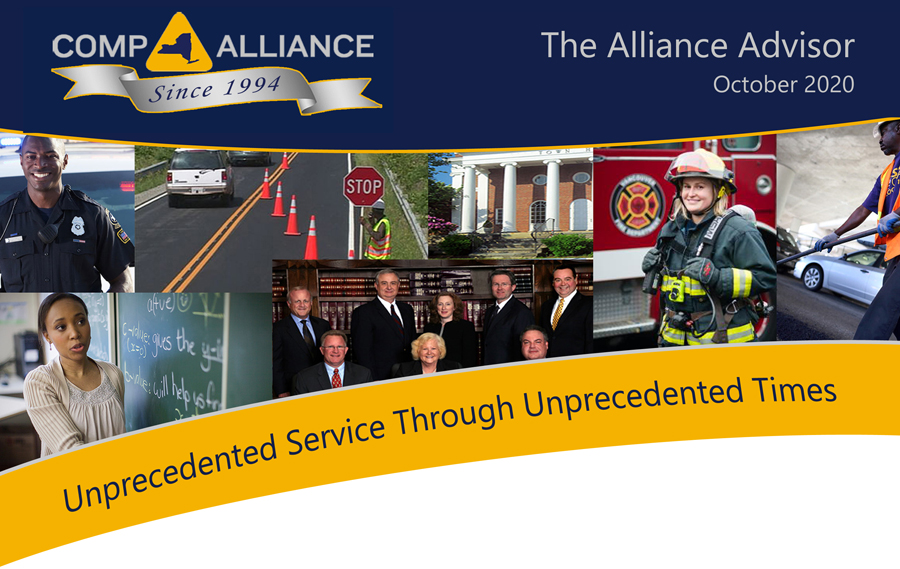
In This Issue
- Comp Alliance Issues Member Loyalty Award for 2020
- NYCOM’s Virtual Fall Training School is a Virtual Hit!
- Live Virtual Safety Seminar Schedule through December 2020
- Fall Back Safely - Daylight Savings Safety
- Key Roles of OSHA and PESH During Pandemic
- NYS Local Governments and Schools to Develop Communicable Disease Continuous Operation Plans
- Safety Culture for the Winter of 2020-2021
- Additional Online Safety Training Resources Added to the Comp Alliance Academy
- When Can I Go Back to Work at School?
- Stay Informed
Read more: The Alliance Advisor October 2020 Quarterly E-Newsletter
We’ve made it to the Fall and Winter seasons of 2020 so let us look at some safety practices to get us through this period of cold, 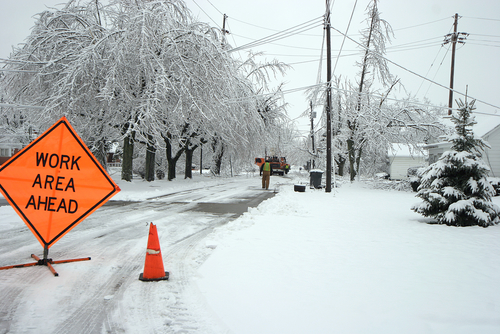 ice, and snow, through the eyes of our Safety Culture program. By now, all of our Comp Alliance members should have a strong focus on their Culture of Safety – the attitudes, beliefs and work practices an organization maintains towards safe work conditions. It equates to the positive application of safety standards within your department. The winter months pose the usual workplace safety concerns but it’s always pertinent to review your department operations and the safety protocols in place.
ice, and snow, through the eyes of our Safety Culture program. By now, all of our Comp Alliance members should have a strong focus on their Culture of Safety – the attitudes, beliefs and work practices an organization maintains towards safe work conditions. It equates to the positive application of safety standards within your department. The winter months pose the usual workplace safety concerns but it’s always pertinent to review your department operations and the safety protocols in place.
The OSHA General Duty Clause relies on each employer to furnish to each of its employees employment and a place of employment which are free from recognized hazards that are causing or are likely to cause death or serious physical harm to its employees. Although there are no Federal or New York State laws that specifically mandate training for your staff on winter safety, the exposures and hazards that municipal workers face during the colder months are covered by the General Duty Clause. For any employee who is required to work outdoors during the winter months, exposure to cold, foul weather and slippery conditions would be considered a “recognized hazard”. It is the employer’s duty to provide training and properly equip the staff to recognize and be protected from these winter hazards.
Slip/Fall Hazards - Your staff should be required to wear proper footwear at all times. In colder months, your staff should be reminded to check the treads of their work boots/shoes to help to prevent slips and falls on wet or icy surfaces. For work on extremely slippery surfaces, the use of cleats or slip-on grips may be needed – these are especially helpful for police officers. Your staff should also be reminded to take it slow and maintain a stable center-of-gravity when walking across slippery yards or parking lots. Office staff should be instructed to wear boots to and from their cars and change to office footwear once they arrive indoors. Slick conditions (ice, snow, leaves) should also be noted and corrected as soon as possible, and watch for areas that accumulate water and ice quickly.
Shoveling Snow – the physical demand of removing snow by hand can cause serious injury. Working out in the cold for extended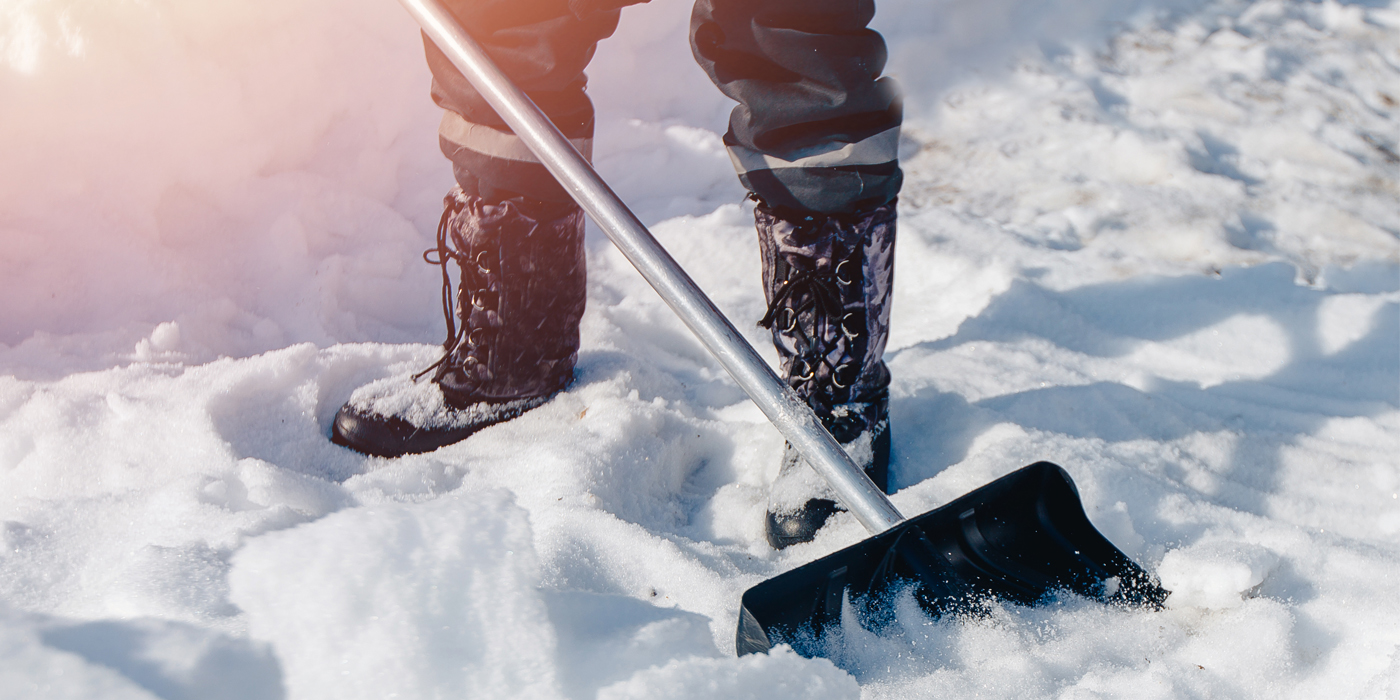 periods, coupled with strenuous activities and over-exertion, especially if a person does not exercise regularly, can result in a heart attack or other serious injuries. Warm-up exercises before shoveling snow are recommended, as are frequent rest breaks to warm up and prevent dehydration. Stop shoveling if you experience shortness of breath, chest pain or any other signs of a heart attack. When manually removing snow, choose a shovel that has a comfortable grip and is the correct height and length of the user. Spacing your hands on the grip to increase leverage and pushing the snow, instead of lifting it will help to prevent back injuries.
periods, coupled with strenuous activities and over-exertion, especially if a person does not exercise regularly, can result in a heart attack or other serious injuries. Warm-up exercises before shoveling snow are recommended, as are frequent rest breaks to warm up and prevent dehydration. Stop shoveling if you experience shortness of breath, chest pain or any other signs of a heart attack. When manually removing snow, choose a shovel that has a comfortable grip and is the correct height and length of the user. Spacing your hands on the grip to increase leverage and pushing the snow, instead of lifting it will help to prevent back injuries.
Cold Stress - Anyone who is required to work outdoors, or in unheated or poorly heated garage bays and utility buildings, during the winter months is at risk of cold stress related injuries. Sanitation workers, highway department employees, police and fire personnel, snow clean-up and removal crews, as well as emergency medical technicians should be reminded to take proper precautions over the coming months. Proper dress (layers, avoid tight clothing), winter hats and gloves (no scarves near equipment), stay dry and hyrdrated are keys to avoiding cold stress.
Cold winter weather and wind chills force the body to work harder to maintain the core temperature. (Wind Chill is the temperature that the body feels when air temperature and wind speed are combined.) Prolonged work in cold environments may drive down skin temperature and cause serious health problems, tissue damage and even death.
When faced with prolonged exposure to cold, the body strives to maintain core internal temperature, shifting blood flow away from the outer skin and extremities,(hands, feet, arms and legs), to the chest and abdomen. This shift causes the skin and extremities to cool and may result in frostbite, hypothermia and a condition known as trench foot.
Workers who have to work outdoors for extended periods should be provided with warming stations or be allowed to take frequent breaks indoors. Warm, sweetened liquids, (non-alcoholic), should be provided, as it is easier to become dehydrated in colder weather. Working in teams is recommended so that the staff can monitor each other for signs of cold stress.
Winter Driving – A majority of deaths and serious injuries during snow and ice conditions occur from vehicle accidents! Safe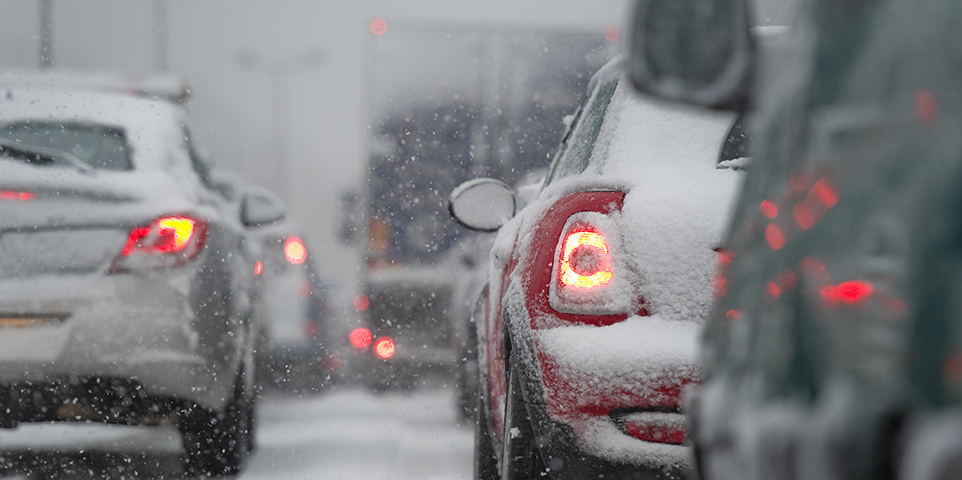 driving practices should be stressed with your employees throughout the entire year. However, during the winter season, when faced with hazardous road conditions that are not under your control, your municipal drivers should be reminded of your safe driving policies regularly. Commercial Motor Vehicles require a pre-trip inspection prior to operation, and special attention to plow trucks is necessary. Drivers should be wearing proper reflective clothing in the event they have to leave their vehicle while on-route. A good vehicle maintenance program should be in place to ensure that all fluids are at proper levels, brakes and tires are in good condition and cooling, electrical and exhaust systems are functioning properly. Emergency notification equipment should also be available and maintained in the event of a vehicle breakdown.
driving practices should be stressed with your employees throughout the entire year. However, during the winter season, when faced with hazardous road conditions that are not under your control, your municipal drivers should be reminded of your safe driving policies regularly. Commercial Motor Vehicles require a pre-trip inspection prior to operation, and special attention to plow trucks is necessary. Drivers should be wearing proper reflective clothing in the event they have to leave their vehicle while on-route. A good vehicle maintenance program should be in place to ensure that all fluids are at proper levels, brakes and tires are in good condition and cooling, electrical and exhaust systems are functioning properly. Emergency notification equipment should also be available and maintained in the event of a vehicle breakdown.
Remember take a look at your commencing winter operations and review the safety protocols for each. Confirm that employee attitudes and values benefit your safety culture through commitment to realistic safety practices for continuous organizational learning, improving hazard awareness and management for hazards shared across the workforce.
As Covid-19 persists, so does the statewide requ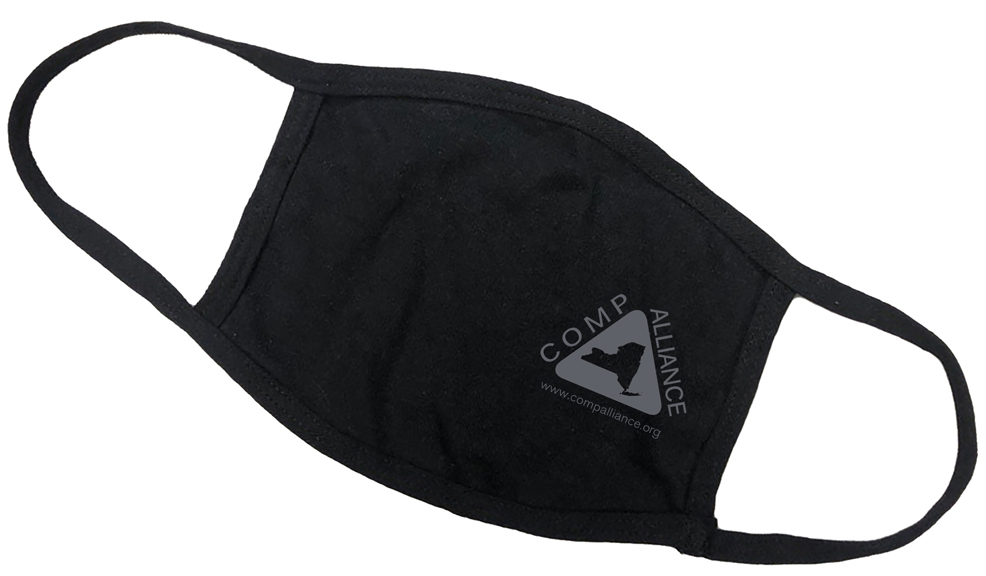 irement that all employees who are present in the workplace be provided and wear face coverings when in direct contact with customers or members of the public. Throughout the spring and summer, we provided disposable facemasks to our members to help comply with this mandate and keep the municipal workforce safe. As an extension of this effort, the Comp Alliance is now providing reusable, washable face masks, along with an additional supply of disposable masks, to our members.
irement that all employees who are present in the workplace be provided and wear face coverings when in direct contact with customers or members of the public. Throughout the spring and summer, we provided disposable facemasks to our members to help comply with this mandate and keep the municipal workforce safe. As an extension of this effort, the Comp Alliance is now providing reusable, washable face masks, along with an additional supply of disposable masks, to our members.
Covid-19 has affected municipal operation by presenting new safety concerns, causing fiscal stress and significantly limiting in-person trainings and education. The Comp Alliance has helped its members adapt to these changes by providing face coverings, issuing fiscal relief in the form of workforce reduction credits and member loyalty awards, and significantly enhancing our virtual resources and training content. While we hope that this pandemic is behind us sooner rather than later, we look forward to assisting our members maintain the safest workplace possible for employees and the public until it is.
Please stay safe and we wish you good health.
Recently, Governor Cuomo passed legislation (S8617B/A10832) that will require all public employers to create plans to adequately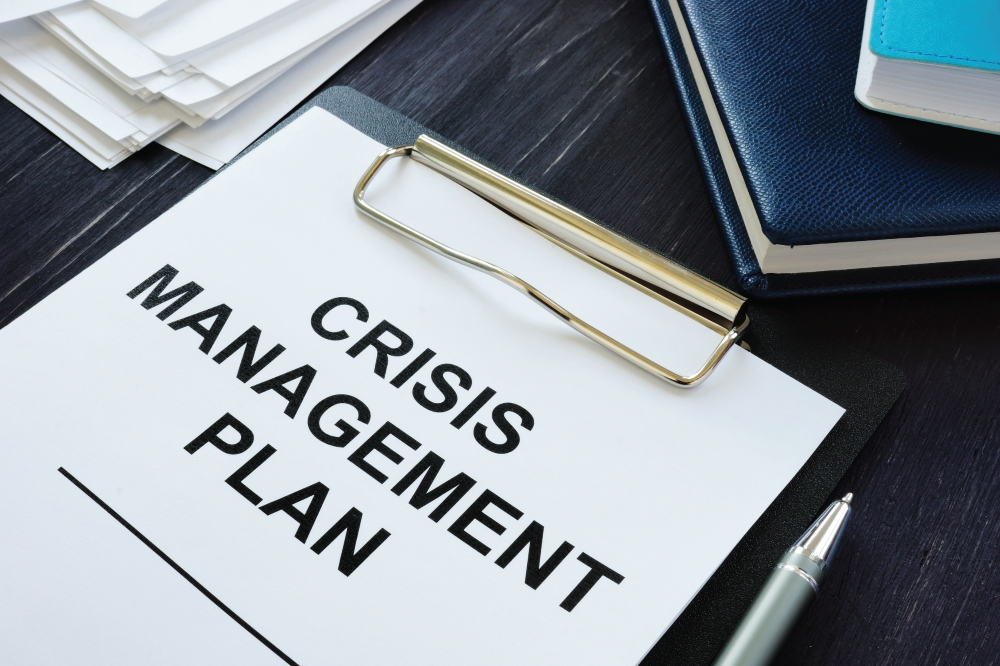 protect workers in the event of another state disaster emergency involving a communicable disease. The plans would apply to both the state and localities, including school districts. Plans must be submitted to unions and labor management committees with 150 days (roughly by February 1, 2021) and plans need to be finalized on April 1, 2021.
protect workers in the event of another state disaster emergency involving a communicable disease. The plans would apply to both the state and localities, including school districts. Plans must be submitted to unions and labor management committees with 150 days (roughly by February 1, 2021) and plans need to be finalized on April 1, 2021.
The plans are intended to protect public workers at all levels of government, from a future pandemic and the health crisis conditions it may pose to the state. The plans will include protections for essential workers and protocols for securing Personal Protective Equipment (PPE).
According to the legislation, Operation Plans must include the following information, at a minimum:
- List and description of positions considered essential
- Descriptions of protocols to follow to enable all non-essential employees to work remotely
- Description of how employers would stagger work shifts to reduce overcrowding
- Protocols for PPE
- Protocol for when an employee is exposed to disease
- Protocol for documenting hours and work locations for essential workers
- Protocol for working with essential employees' localities for identifying emergency housing if needed
- Any other requirement determined by the New York State Department of Health, such as testing and contact tracing
The majority of these above points have, most likely, already been discussed and instituted at your municipality or school district, in which case they would have to be re-visited and placed into document-form for your plan. Although NYS has not yet produced a model template for local governments and school districts to utilize, there are some sample planning resources available to assist in this process and at a minimum, provide guidance on what to include in your Operation Plan.
They include:
Center for Disease Control (CDC) - https://www.cdc.gov/flu/pandemic-resources/planning-preparedness/state-local-government-planning.html
Federal Emergency Management Agency (FEMA) - https://www.fema.gov/media-library-data/1396880633531-5405f61d483668155492a7cccd1600b/Pandemic_Influenza_Template.pdf
NYS Department of Health (DOH) - https://www.governor.ny.gov/sites/governor.ny.gov/files/atoms/files/NYS_BusinessReopeningSafetyPlanTemplate.pdf?fbclid=IwAR0-ccsUuOmhCm9UlQNtdz8ufxdPtQFXzKUpSiSzf9Ie9vv4hZumc-BUlyI
The Comp Alliance will keep members up-to-date on developments related to these Operation Plans from NYS – if/when sample templates are available from NYS, if any new requirements are necessary, if timelines change, etc. Our Risk Management department will provide assistance where we can, in an effort at reducing workplace injuries and exposures during a future communicable disease pandemic crisis.
Upcoming Events
| No events |

